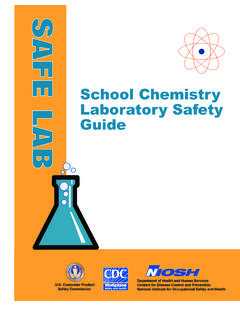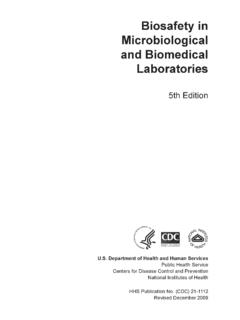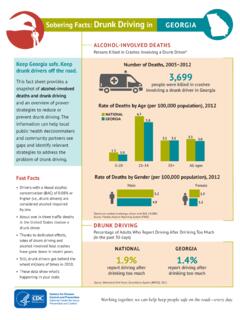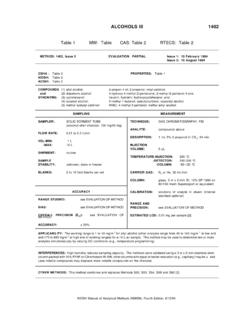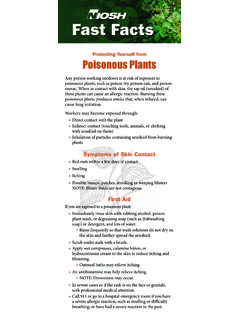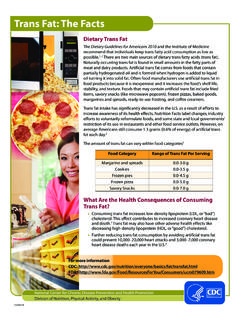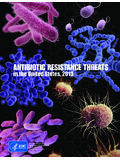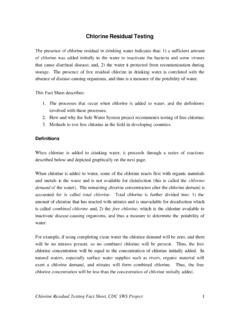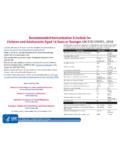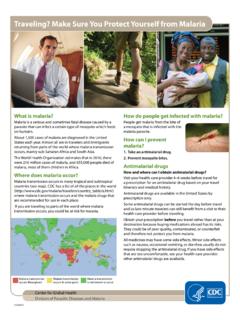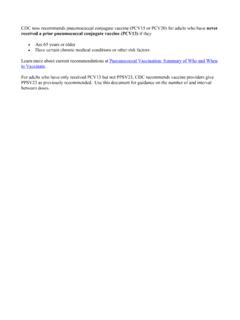Transcription of ACOG-Summary of Maternal Immunization Recommendations
1 Summary of Maternal Immunization RecommendationsResources for health care professionalsLast Updated December 2018 vaccine *Indicated DuringEvery PregnacyMay Be Given During Pregnancyin Certain PopulationsContraindicated During PregnancyCan Be InitiatedPostpartum or WhenBreastfeeding or Both Inactivated influenzaTetanus toxoid, reduceddiptheria toxoid and acellular pertussis (Tdap) pneumococcal vaccinesMeningococcal conjugate (MenACWY) and Meningococcal serogroup BHepatitis BHumanpapillomavirus (HPV)**Measles, mumps, and rubellaVaricellaVaccines help keep your pregnant patients and their growing families ,1,2X ,7X ,8X#,9,10X X ,5,6X ,8X#,9,10X**,11,12X ,13,14X ,13,15,16X X X ,5,6X ,3,4X ,7X Reprinted from Maternal Immunization .
2 ACOG Committee Opinion No. 741. American College of Obstetricians and Gynecologists. Obstet Gynecol 2018;131:e214 7*An X indicates that the vaccine can be given in this window. See the corresponding numbered footnote for details. Inactivated influenza vaccination can be given in any trimester and should be given with each influenza season as soon as the vaccine is available. The Tdap vaccine is given at 27 36 weeks of gestation in each pregnancy, preferably as early in the 27 36-week window as possible. The Tdap vaccine should be given duringeach pregnancy in order to boost the Maternal immune response and maximize the passive antibody transfer to the newborn.
3 Women who did not receive Tdap during pregnancy (and have never received the Tdap vaccine ) should be immunized once in the immediate postpartum 3 Vaccination during every pregnancy is preferred over vaccination during the postpartum period to ensure antibody transfer to the ,4 There are two pneumococcal vaccines: 1) the 23-valent pneumococcal polysaccharide vaccine (PPSV23) is recommended in reproductive-age women who have heart disease,lung disease, sickle cell disease, and diabetes as well as other chronic illnesses; 2) the 13-valent pneumococcal vaccine (PCV13) is recommended for reproductive-aged women with certain immunocompromised conditions, including human immunodeficiency virus (HIV) infection and asplenia.
4 The PCV13 vaccineshould be deferred in pregnant women, unless the woman is at increased risk of pneumococcal disease and after consultation with her health care provider the benefits of vaccination are considered to outweigh the potential ,6 Quadrivalent conjugate meningococcal vaccine is routinely recommended for adolescents aged 11 18 years, along with individuals with HIV infection, complementcomponent deficiency (including eculizumab use), functional or anatomic asplenia (including sickle cell disease), exposuroutbreak, travel to endemic or hyperendemic areas, or work as a microbiologist routinely exposed topreclude vaccination.
5 The serogroup B vaccine should be deferred in pregnant women, unless the woman is at incr e during a meningococcal disease . If indicated, pregnancy should not eased risk of serogroup B meningococcal disease7and, after consultation with her health care provider, the benefits of vaccination are considered to outweigh the potential Pregnant women with any of the conditions that increase the risk of either acquiring or having a severe outcome from hepatitis A infection (eg, having chronic liverdisease, clotting-factor disorders, traveling, using injection and noninjection drugs, and working with nonhuman primates) should be vaccinated during pregnancy ifnot previously vaccinated.
6 Pregnant women at risk of hepatitis A infection during pregnancy should also be counseled concerning all options to prevent hepatitis Ainfection. Any woman who wants to be protected from hepatitis A or has an indication for use may receive the vaccine during pregnancy or during the postpartum # Hepatitis B vaccination is recommended for women who are identified as being at risk of hepatitis B infection during pregnancy (eg, women who have householdcontacts or sex partners who are hepatitis B surface antigen positive; have more than one sex partner during the previous 6 months; have been evaluated or treatedfor a sexually transmitted infection; are current or recent injection-drug users; have chronic liver disease.)
7 Have HIV infection; or have traveled to certain countries). Any woman who wants to be protected from hepatitis B or has an indication for use may receive the vaccine during pregnancy and the postpartumperiod. Pregnant women at risk of hepatitis B infection during pregnancy should be counseled concerning other methods to prevent hepatitis B ,9** The HPV vaccination in pregnancy is not recommended, however, inadvertent HPV vaccination during pregnancy is not associated with adverse events for thewoman or her fetus. The HPV vaccine can be given to postpartum and breastfeeding women. The HPV vaccine should be administered to women through age 26 years who were not previously vaccinated.
8 Vaccination timing and number of doses should follow Centers for Disease Control and Prevention and American College of Obstetricians and Gynecologists ,12 Live attenuated vaccines including, measles mumps rubella, varicella, and live-attenuated influenza vaccine are contraindicated for pregnant women. If indicated (ie, among seronegative women), the measles mumps rubella vaccine and the varicella vaccine should be given during the postpartum administration during pregnancy has not been associated with congenital rubella or congenital varicella 16 Hepatitis A1. Influenza vaccination during pregnancy.
9 Committee Opinion No. 732. American College of Obstetricians and Gynecologists. Obstet Gynecol 2018;131:e109 Centers for Disease Control and Prevention. Pregnant women and influenza. Atlanta (GA): CDC; Centers for Disease Control and Prevention. Pregnancy and whooping cough. Atlanta (GA): CDC; Update on Immunization and pregnancy: tetanus, diphtheria, and pertussis vaccination. Committee Opinion No. 718. American College of Obstetricians and Gynecologists. Obstet Gynecol 2017;130:e153 Centers for Disease Control and Prevention. Use of 13-valent pneumococcal conjugate vaccine and 23-valent pneumococcal polysaccharide vaccine for adults with immunocompromising conditions: Recommendations of the Advisory Committee on Immunization Practices (ACIP).
10 MMWR Morb Mortal Wkly Rep. 2012;61:816 Updated Recommendations for prevention of invasive pneumococcal disease among adults using the 23-valent pneumococcal polysaccharide vaccine (PPSV23). Centers for Disease Control and Prevention, Advisory Committee on Immunization Practices. MMWR Morb Mortal Wkly Rep. 2010;59:1102 Folaranmi T, Rubin L, Martin SW, Patel M, MacNeil JR. Use of serogroup B meningococcal vaccines in persons aged 10 years at increased risk for serogroup B meningococcal disease: Recommendations of the Advisory Committee on Immunization Practices, 2015. Centers for Disease Control [published erratum appears in MMWR Morb Mortal Wkly Rep.]
